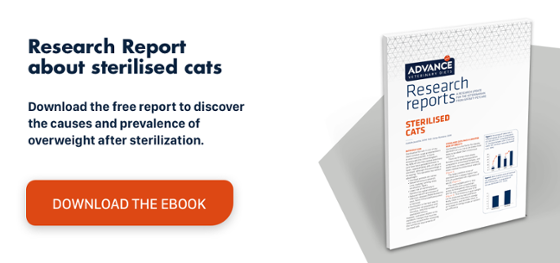Urinary disease and stress in cats
Feline lower urinary tract disease (FLUTD) describes any disorder in cats that affects the urinary bladder or urethra. The causes are urolithiasis, anatomical defects, bacterial urinary tract infections or neoplasms; but in most cats the exact causes are unclear. These cats are classified as having a syndrome known as feline idiopathic cystitis (FIC), which is the most common cause of FLUTD.2
Cats diagnosed with FIC may have urethral obstruction, non-obstructive disease with acute self-limiting episodes, frequently recurring episodes or persistent chronic events. The most common clinical signs are stranguria, periuria, haematuria, dysuria and polyuria. However, these signs are not specific to FIC and may also occur in cats with other causes of FLUTD. A urinalysis of cats with FIC may show a range of results, but in most cases the urine is concentrated and acidic. Some cats also have proteinuria and crystalluria. However, these urine parameters are specific, as they are found in cats with any type of FLUTD.2
In most cases, the clinical signs of non-obstructive FIC resolve within 7 days without treatment. However, they are very likely to recur. Up to 65% of cats with acute FIC will experience one or more recurrences within a year.2
Urolithiasis is the second most frequent cause of feline lower urinary tract disease,1 and may account for up to 21% of cats presenting clinical signs.3 Stones are usually located in the bladder and urethra, and can be classified according to the type of mineral in the composition.1 Calcium oxalate and struvite stones are the two most common types.3
Stones in the urinary tract can irritate the mucous membranes resulting in clear signs of inflammation and predisposing the animal to infection and consequently urethral obstruction. Kidney stones, on the other hand, may cause significant renal dysfunction.4
Stress and urinary diseases in cat
Domestic cats are exposed to stressful stimuli, which can have a negative effect on their well-being and trigger a series of behavioural changes.5
Cats with feline idiopathic cystitis (FIC) often have chronic or recurrent signs of a lower urinary tract problem and other comorbidities that are aggravated by stress factors. For cats, these stressors include loud or unfamiliar noises, sudden movements, new and unknown locations and objects, and strangers (people, cats, or other animals) encroaching on their personal space. So it is important to take these factors into account when assessing a cat’s well-being.6
Although we do not fully understand the precise mechanism by which stress contributes to FIC, it appears that the glycosaminoglycan layer of the bladder wall is thinner in cats with FIC than in healthy cats, and the increased activation of the sympathetic nervous system alters bladder permeability.5
Benefits of a special diet
Diet plays a key role in the treatment of urolithiasis in both cats and dogs, once each patient’s individual risk factors have been identified. The treatment of some stones (struvite, uric acid, cystine) largely depends on a specific dietary profile that controls dietary precursors and/or urine pH.1
Diets exclusively for the treatment and prevention of struvite uroliths are acidifying and low in magnesium, resulting in acidic urine and hypomagnesaemia.1
ADVANCE, an expert in advanced nutrition, has therefore designed a specific solution to this problem – the Urinary Stress diet – which forms part of its range of ADVANCE Veterinary Diets.
Urinary Stress provides complete, balanced nutrition for use as a long-term daily diet in adult cats.
The diet has been clinically tested and the results confirmed the multiple benefits it offers cats:
- Helps reduce stress, which is a predisposing factor for FIC, urine marking and urination in inappropriate locations, thanks to the presence of lemon balm, tryptophan and fish peptides.
- Helps reduce the formation of crystals in the urine, since it is formulated with a moderate level of magnesium, and higher sodium and potassium levels to reduce the relative supersaturation of oxalate and struvite.
- Helps protect and restore the integrity of the urinary epithelium, thanks to supplementation with glucosamine and chondroitin.
Conclusions
Feline lower urinary tract diseases are multifactorial pathologies which may be greatly affected by diet and stress, among many other factors. As such, it is important to intervene in these two areas, especially in cats with recurrent FIC. ADVANCE Urinary Stress offers a dietary solution to this problem.

